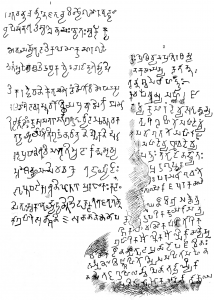
14-19) ………… The son of mahārājādhirāja, the prosperous Samudragupta—who was the exterminator [of all kings], who had no equal adversary on earth, [whose fame was tasted by the waters of the four oceans],who was equal to (the gods) [Dhanada and Varuṇa], Indra and Antaka, [who was the very axe] of Kṛtānta (god of death), who was the giver of many crores of lawfully acquired cows and gold], who was the performer of the aśvamedha sacrifice, that had long decayed, [who was the son of the son’s son of mahārāja, the prosperous Gupta], who was the son’s son of [mahārāja the prosperous] Ghaṭotkaca (and) who was [the son] of the mahārājādhirāja, [the prosperous Candragupta (I), (and) the daughter’s son of Licchavi], begotten on the Mahādevī Kumāradevī.
19-21) (was) an ardent devotee of Bhagavat (Vāsudeva), the mahārājādhirāja, [the prosperous Candragupta (II)], who was selected (as successor) by him; [who was born of] the Mahādevī [Dattadevī], (and) [who was himself without an equal adversary].
21-22) [His son], who meditated on [his feet], (and) [who was born of the Mahādevī Dhruvadevi], (was) [the ardent devotee of Bhagavat (Vāsudeva)], [the mahārājādhirāja, the glorious Kumāragupta].
22-23) His [son] who meditated on his feet, (and) [who was born of the Mahādevī Anantadevī (is) an ardent devotee of Bhagavat (Vāsudeva), the mahārājādhirāja, the prosperous] Skandagupta.
24-31) [His son, who meditated on his feet (and) who was born of the Mahādevī Candradevī (is) the] ardent devotee of Bhagavat (Vāsudeva) [the mahārājādhirāja, the prosperous Budhagupta]. [I issue a command] …………of the town of Ajapura in the ……in the …… viśaya ………… a perpetual endowment ………… a village-field ………… the Uparika, the Kumārāmātya ………… acquired by the merchant …………in the seat (of office) (?) of the Agrahāṛka, the Śaulkika, and the Gaulmika …………and others who subsist on our favour.
31-33) “I have been requested by …………varman, by my father’s father ………… by the Bhaṭṭa Gihilasvāmin, ………… belonging to Bhadrāryā…………”